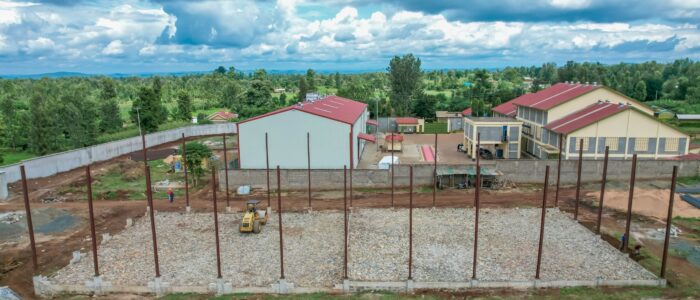Boost for coffee farmers as Kirinyaga County constructs mega warehouse for storage to support direct sale
The County Government of Kirinyaga County Government is constructing a coffee storage warehouse to strengthen farmer’s capacity to directly market and sell their produce at the auction.
The state-of-the art warehouse is expected to benefit over 120,000 coffee farmers in the county.
The warehouse that is coming up at the Kirinyaga County Cooperative Union premises in Kimicha along Kutus-Kagio highway is expected to address post-harvest challenges and improve earnings for the farmers.
It will have the capacity to hold up to 40,000 bags of parchment coffee- coffee that has been pulped, fermented and dried but not yet milled- and will be fitted with modern features such as aeration cyclones to ensure quality preservation.
Governor Anne Waiguru said the project is aligned to her administration’s vision to empower farmers increase earnings from production, value addition, processing and marketing in order to uplift their living standards. She noted that the union has been constrained in terms of coffee storage since their existing facility is unable to hold increasing volumes of coffee.
She emphasized the broader vision behind the project. “Once complete, this warehouse will enable us to store and mill coffee from all over the county at our facility. My administration remains committed to making favorable policies that will strengthen coffee farming and ensure our farmers get value for their produce,” she said, noting that the efforts has paid off with Kirinyaga farmers getting the highest payoff in last season’s coffee where some cooperatives paid as high as Ksh.149 per kilo.
Kirinyaga coffee farmers market their produce under the auspices of their union’s Kirinyaga Slopes Coffee Brokerage Company which works closely to the County Government to improve the entire coffee value chain from milling to marketing. The firm attained its brokerage status in 2023 after Governor Waiguru assisted in fast-tracking the issuance of its brokerage license at the Capital Markets Authority. The firm has since been one of the best performing at the Nairobi Coffee Exchange
Kirinyaga Slopes serves 14 cooperative societies across the county namely Mwirua, Kibirigwi, Inoi, Mutira, Kabare, Baragwi, Kanjuu, Mirichi, Rwama, Ngiriambu, New Ngariama, Rungeto, Thirikwa, and Karithathi all representing over 120,000 smallholder coffee farmers.
Geoffrey Kinyua, Chairman of the Kirinyaga County Cooperative Union, said the county’s rapidly growing production had created a pressing need for additional storage space.
“We produced around 42,000 tonnes of cherry last year and we expect to reach 60,000 tonnes soon which the old warehouse couldn’t handle.” he said.
He noted that consolidating of Kirinyaga’s coffee through Kirinyaga Slopes has helped improve its visibility and value in the auction market. He noted that the upcoming warehouse is at 40% completion and is expected to be completed by the end of the year.
At the heart of the coffee transformation is a clearly structured processing system which Patrick Kahonge, Mill Manager at Kirinyaga Slopes says starts with the farmer delivering their red cherry at cooperative factories for pulping and fermenting after which the beans are sun or solar dried until they attain the required moisture content of 10 to 11 percent. The parchment coffee is then brought to the dry mill for grading based on quality. Once milled, clean coffee beans are dispatched to national marketing warehouses for distribution and sale.
Kahonge said the new warehouse will fill a critical gap in the chain. “This warehouse measures 22 by 50 meters and is equipped to hold 40,000 bags of parchment coffee. The inclusion of cyclones ensures proper aeration, which is essential for maintaining coffee quality before milling,” he reiterated.
With improved infrastructure, consolidated processing, and strong policy backing, Kirinyaga’s coffee farmers are expected to be more competitive in both local and international markets.
The project is being implemented by the county government under the National Agricultural Value Chain Development Project whose goal is to transform smallholder farmers in the counties into commercial farmers by improving their value chains and market access. It invests in infrastructure, financial services and sustainable agricultural practices relying on community interest groups (CIG) and Farmers Producer Organizations (FPOs) to reach and empower farmers







